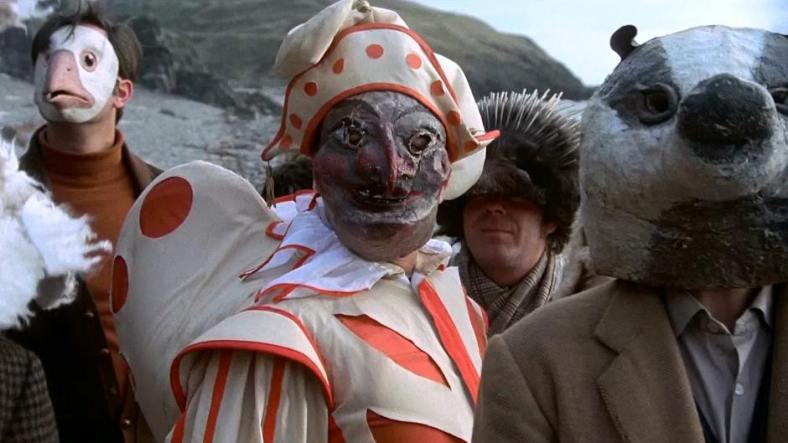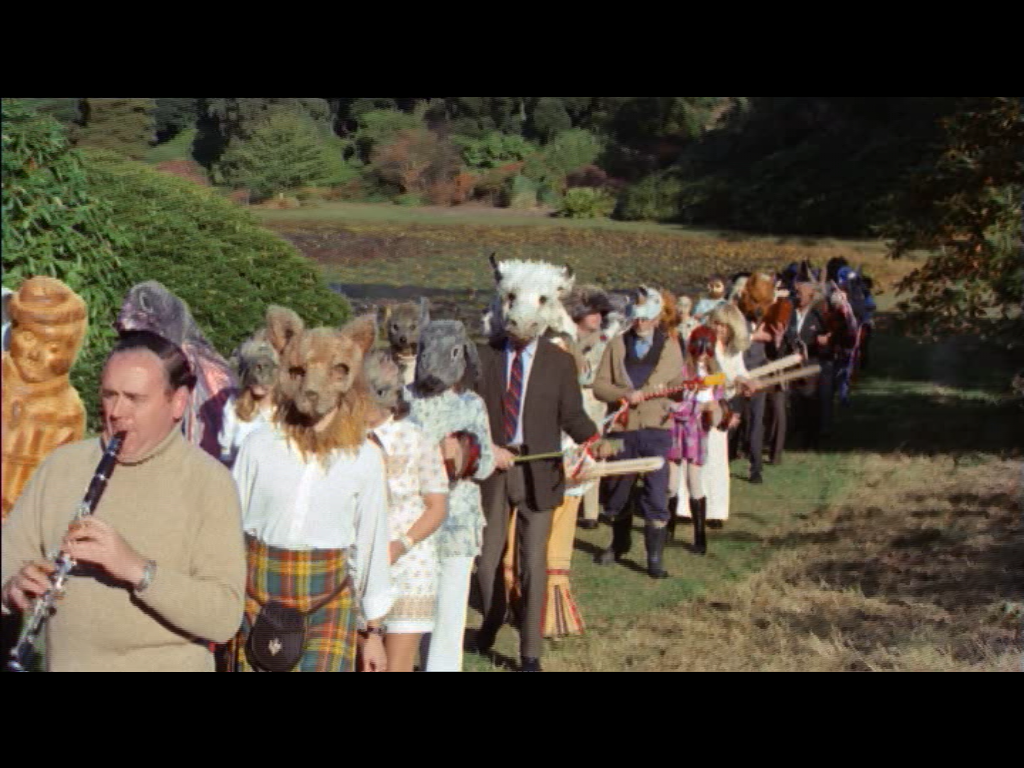Pagan Panic, Free Love, and Blasphemy in ‘The Wicker Man’

It’s easy to see why Christianity has defined so much of the horror genre. The excesses of apostolic ritual, its insistence on extreme moralism, the deep fears of being corrupted by darkness; many denominations lend themselves to theatrical stories of a heightened battle between good and evil. Christian characters expectantly populate stories of the demonic; whether they be exorcists grappling with their faith, or the “low key Conservative vibes” of Ed and Lorraine Warren. But if Christianity gives our characters the tools to shield themselves from evil, it also gives them a lot of fears; ones that make them vulnerable if they’re preyed on by subversive forces.
In The Wicker Man, Scottish Highland policeman Neil Howie (Edward Woodward) arrives on Summersisle, a tiny Hebridean island, to investigate the supposed disappearance of a young girl, Rowan. Once he’s there, his steadfast Christian values are challenged by the explicit, folksy paganism of the islanders. The church is abandoned, the ministers fled, and the despondent islanders are hungry for old gods and, amongst other things, dry humping gravestones. Christianity is out, and a celebration of nature, reincarnation, and sun gods are in. The human body is not something to be kept in strict, shameful order. It is to be celebrated and displayed naked as much as the coastal Scottish weather allows it. Schoolchildren are taught about reincarnation and phallic symbols. Lusty folk songs are sung directly to the innkeeper’s fair daughter. And—above all else—everyone acts a bit weird.
Also Read: 5 Ultimate Found Footage Folk Horror Films
To a normal audience member, none of this is particularly scary. It’s rather an amusing glance into a sheltered, alternative 70s world. But to our protagonist, a devout believer in God and law, it’s terrifying. His efforts to restore traditional order lead him down a path at the end of which lies something unimaginable.
Howie has many problems with Summersisle, but above all else, he despises their blasphemy. Rowan’s disappearance and the obstructive nature of the islanders sometimes feel like a lower priority than expressing his disgust at the free-loving, sexually expressive, scientifically “alternative” nature of the island. As a strict police officer, he always feels he has sufficient authority to challenge Summersisle’s paganism, despite there being one of him and a lot of sun god worshippers. But societal and religious order feel like a mighty strong protector even if you’re just on your own.

While there’s a lingering unease over the film, you couldn’t fairly call it something like dread. Rather, the characters are defined by an off-kilter cheekiness. Howie is being lured to the island so he’ll basically freely walk into being a human sacrifice (being burned alive in a huge wicker facsimile of a man) to save the island’s crops. On a rewatch, you get the sense that the islanders are deliberately trying to weird him out. It’s as if they’re dialing up the strangeness of their paganism because he bears no threat to them. He needs to think them as dangerous if he’s ever going to walk into their trap.
Also Read: ‘Troll 2’ Embodies Everything That Can Go Wrong With Folk Horror
The fertility rituals, pelvic thrusting barmaids, hanging a child’s umbilical cord over her grave, leaving fornicating puppets on a bed, and the many, many folk songs (which are surprisingly all earworms); all take on a playful quality once you know they’ve specifically chosen an outsider who will be appalled by them. Blasphemy is funny to them because it’s amusing that tiny acts of subversion and denial can have such a frustrating, even devastating impact on someone. Even as their sacrifice is offered up, they watch with happy, sing-song abandon.
The Wicker Man has developed a well-earned wealth of fans over its near-50 year lifetime. But I come at it from a more specific vantage point. First, as a Scot, this is exactly how I want my country to be represented; thick jumpered, singing gaily, and with a lot of eyebrow acting. But I’m also someone whose Christian faith has waned as I’ve grown older, and who’s more likely to look at my former religion critically.
Also Read: Hammer’s Folk Horror ‘Wake Wood’ Makes Kids Scary
To take away from The Wicker Man that “paganism is evil” is to misread the ending. The film’s critique of religious extremism extends to Howie’s beliefs, as well. When trapped in that wickerwork behemoth, Howie realizes that, while he knows for a fact that the pagans’ beliefs are wrong, such a conviction hasn’t saved him. He balks at the realization that the islanders cannot be confronted or convinced by the fact that there’s no proof their rituals work, that people are more than capable of committing horrific acts with no evidence for their effectiveness.
In his last moments, Howie sings a hymn to cover the fear that likely consumes him: what has been done in the name of my religion that has wreaked similar harm? Who has died exactly as I have, knowing that the cause is unjustified? What’s scary to Howie is not the pagans’ transgressions, but how little they care about them. He’s scared of a world where it’s normal to defy God. The moral high ground he takes in Summersisle blinds him from the fact that he is the only one not in control. If he was a little less outraged, he might be able to see what lay ahead of him. The people of Summersisle predicted his outrage, and took advantage of it. If Howie wasn’t as panicked about the pagans, maybe that wicker man would have been left empty on May Day.
Categorized:Editorials News

